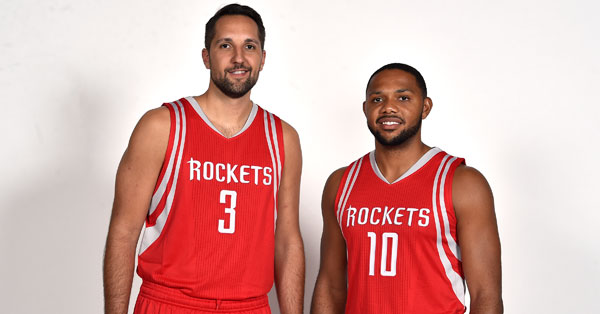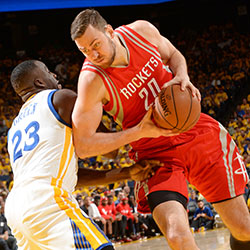Houston Rockets
Houston Rockets Salary Cap Update: 2016 Offseason Edition
A complete breakdown of the Houston Rockets salary cap situation now and heading towards 2017.
Published
9 years agoon
Well, that was an eventful Saturday afternoon press conference!
At that press conference, the Houston Rockets introduced their two key free agent acquisitions, sharpshooting power forward Ryan Anderson (“4 years, nearly $80 million) and dynamic scoring guard Eric Gordon (4 years, nearly $53 million). Both players are expected to add much-needed shooting, floor-spacing and shot creation to an offense that relied far too heavily on James Harden last season.
Then, in a surprise move, the Rockets also announced that they had renegotiated and extended Harden’s deal so that he will get paid the maximum salary through 2020 (the last season being a player option). I wrote more about that extension here
This seemed like as good a time as any to examine these moves (and others) and their salary cap implications for the Rockets.
Since My Last Update…
Here are some Rockets-related moves that happened since my last salary cap update:
- In the 2016 NBA Draft, the Rockets selected Chinanu Onuaku (6-10 C out of Louisville) with the 37th pick and Zhou Qi (7-1 C out of China) with the 43rd pick
Immediately following the draft, Houston agreed in principle to multi-year partially-guaranteed deals with undrafted free agents Gary Payton II (6-3 PG out of Oregon State), Isaiah Taylor (6-3 PG out of Texas) and Kyle Wiltjer (6-10 PF out of Gonzaga)
- Dwight Howard opted out of his contract for 2016-17 and later agreed to a new 3-year, $70 million deal with the Atlanta Hawks
- The Rockets extended a qualifying offer to Donatas Motiejunas, making him a restricted free agent (no qualifying offer was made to Terrence Jones, who became unrestricted)
- The salary cap for the 2016-17 season was set at $94.143 million (with a luxury tax threshold of $113.287 million)
- On the second day of free agency, the Rockets agreed to deals with Anderson and Gordon
- The Rockets agreed in principle to a one-year, $2.9 million deal with Nene (Hilario)
- In order to clear cap room for the Anderson and Gordon deals and the Harden extension, Houston renounced its rights to free agents Howard, Jones, Josh Smith and Jason Terry and also waived Andrew Goudelock
Player Salary, Exceptions and Available Cap Room
The Houston Rockets currently have the following player salary commitments, cap holds and salary cap exceptions available for the 2016-17 season:
Player salary commitments: Harden ($26.54 million), Anderson ($18.7 million), Gordon ($12.4 million), Trevor Ariza ($7.81 million), Brewer ($7.61 million), Beverley ($6.0 million), K.J. McDaniels ($3.33 million), Sam Dekker ($1.72 million), Michael Beasley ($1.40 million – non-guaranteed until August 1), Clint Capela ($1.30 million), and Montrezl Harrell ($1.05 million).
Cap holds: Motiejunas ($5.72 million – Rockets hold full Bird rights). Second round picks (like Onuaku or Zhou Qi) do not count against the cap until they are signed. Since none of Payton, Taylor or Wiltjer have actually signed, none of them count against the cap.
Other Salary Cap Exceptions: Because the Rockets opted to drop below the salary cap in order to use their available cap room on Anderson, Gordon and Harden, they have lost the use of the “full” Mid-Level Exception and the Bi-Annual Exception. Instead, they are limited to using the Room Exception ($2.898 million), which can be utilized once they use all of their cap space. Presumably, this Room Exception has been dedicated to Nene.
Given these salary commitments, cap hold and exceptions, and based on a 2016-17 salary cap of $94.143 million, the Rockets have only a little more than the rookie minimum salary’s worth of cap room remaining. If Motiejunas leaves in free agency, Houston’s available cap room could increase to nearly $6.3 million, but for reasons described below, that probably won’t happen. As with all of these updates, these figures assume the Rockets do not make any trades; but as we all know, GM Daryl Morey is always looking for trades that can help his team.
So… What Happens Next?
Bring Back D-Mo: It’s no coincidence that Houston waived its rights to all of its free agents except for Motiejunas. As one of the league’s top remaining free agents on the market, D-Mo will very likely receive an offer sheet (or perhaps even an offer from the Rockets) well in excess of his $5.72 million cap hold. Since the Rockets hold Motiejunas’s Bird rights, they can exceed the salary cap in order to re-sign him or to match any offer sheet. With precious few impact players willing to take $6 million or less in this market – I’m still surprised Houston got Nene for just $2.9 million – odds are that the Rockets follow through with their threats to match any offer sheet for D-Mo, even if it is somewhat excessive. In the alternative, the Rockets could conceivably sign and trade Motiejunas as part of a package for another key contributor, although (what used to be known as) “Base Year Compensation” issues with D-Mo might complicate some trade scenarios.
Save a Little Something for Nanu: Expect the Rockets to use their remaining salary cap room to make Onuaku part of a Rockets tradition that has spanned from Chase Budinger to Chandler Parsons to Isaiah Canaan to Nick Johnson to Harrell. Each of those players were early to mid-second round picks who received a multi-year (three or four seasons) deal from the Rockets with a starting salary above the rookie minimum. (Johnson’s salary was right at the rookie minimum, but he got three years, fully guaranteed.) Morey and company have always tried to lock in these second round picks to longer-term deals in order to secure talent on the cheap. They will likely try to sign Onuaku before signing or matching an offer sheet for Motiejunas. However, given the increased salaries being handed out to other early second rounders this summer (such as Deyonta Davis and Ivica Zubac), there is some risk that Onuaku might take the “K.J. McDaniels Route” and instead accept a one-year rookie minimum deal in order to hit restricted free agency next summer. The Rockets will try to resolve any such issues with Onuaku sooner rather than later.
The Undrafted Guys: While it was reported on draft night that the deals agreed to in principle with Payton, Taylor and Wiltjer were for three years each, the Rockets’ lack of cap room may necessitate that those deals become two-year contracts instead. The third year of each player’s deal was likely non-guaranteed, and each deal was likely negotiated to include a third season to the extent the Rockets had cap room available for that purpose. If there is any additional cap room that opens up, some of it may be used to sign Payton for a third year, then maybe Taylor and/or Wiltjer, too.
Gentile Will Have to Wait: Despite registering interest in playing for coach Mike D’Antoni, it appears 2014 second round pick Alessandro Gentile will have to wait at least another year to play for the Rockets. Reportedly, Gentile recently committed to stay one more year with Olimpia Milano after failing to reach agreement with Houston. With a glut at the wing positions and with little to no cap room to spare (Gentile would have probably required more than the rookie minimum to make the jump to the NBA), a fit could not be found at this time. With several other NBA teams reportedly expressing interest in Gentile, don’t be surprised if Houston trades his draft rights, whether for a future pick or as a sweetener in a larger trade.
Looking Ahead to 2017
The Houston Rockets currently have the following player salary commitments, cap holds and other salary variables for the 2017-18 season:
Player salary commitments: Harden ($28.53 million), Anderson ($19.54 million), Gordon ($12.96 million), Brewer ($7.58 million), Ariza ($7.42 million), Beverley ($5.51 million), McDaniels ($3.48 million – team option), Capela ($2.33 million – team option), Dekker ($1.79 million – team option), and Harrell ($1.09 million)
Cap holds: Nene ($3.48 million – Rockets hold Non-Bird rights), Beasley ($1.01 million – Rockets have Early Bird rights)
Other Variables: Motiejunas (if retained – 2017-18 salary unknown), Onuaku ($905,249 one-year vet minimum, fully guaranteed?), Payton ($905,249 – partially guaranteed?), Houston’s 2017 first round pick ($1.1 million to $2 million cap hold?)
With a projected salary cap of $102 million (recently revised downward from prior estimates as high as $110 million), the Rockets were not expected to have max cap room, even before the Harden extension. Add to that any salary paid to Motiejunas, and that cap room becomes relatively minimal in the grand scheme of attracting star free agents. Even if Motiejunas is allowed to walk this summer, all team options (except for Capela’s) are declined and Brewer is jettisoned for no salary in return, the Rockets wouldn’t have more than about $21 million in cap room in a summer when the lowest max salary is expected to exceed $24 million (subject to further increase in the upcoming CBA negotiations).
If the Rockets are going to add another star in 2017, it will probably need to be either via trade or with cap room created by trading pieces out. But if Houston can get back to its winning ways, there is a decent chance that teams swimming in cash again next summer would be willing to take on some of the Rockets’ role players. (For instance, a trade for Brewer with only one year left on his contract – or after a bounce-back season – would be much more palatable to other teams than dealing for him now and would require less pick compensation from the Rockets in order to move him.)
Also, if the Rockets remain above the cap next summer, they could use the Non-Taxpayer Mid-Level Exception (currently scheduled to be $5.8 million but subject to likely increase in the 2017 CBA) to add another contributor, perhaps including the long-pursued Sergio Llull.
Conclusion
The Houston Rockets have added some significant future pieces and locked up their franchise star longer-term, sending a statement to the league that they will not be in the same boat as teams like the Thunder and Kings, whose stars are (or will be) the subject to constant trade rumors. While cap flexibility may be more limited going forward, as Kevin McHale used to say, “Cap Flexibility” never scored a point or grabbed a rebound. Here’s hoping for many more points, rebounds and wins from Harden and his new crop of Rockets teammates.
You may like
Houston Rockets
Looking Back on the Trade for Phoenix’s Draft Picks
Are the Rockets set to cash in on Phoenix’s downfall or could a Suns retool murky the waters?
Published
1 month agoon
March 12, 2025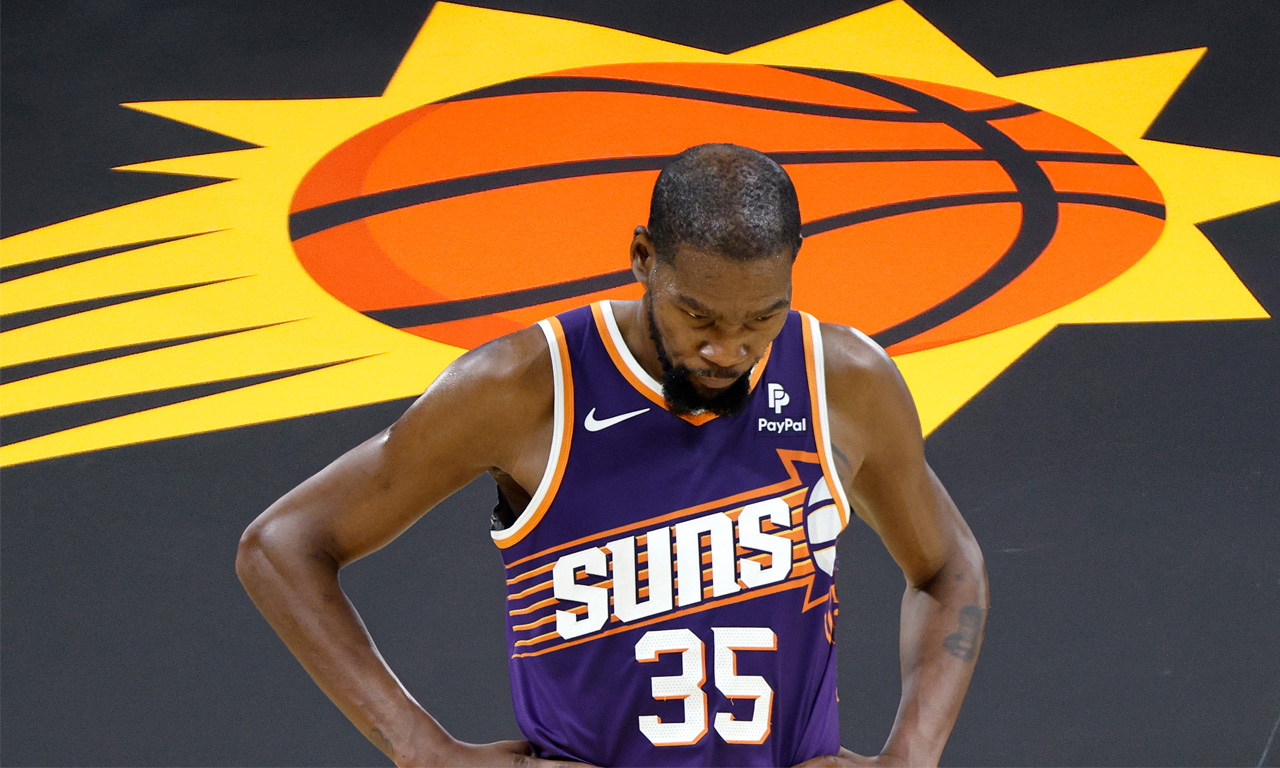
As the Houston Rockets set to host the Phoenix Suns tonight, it seems the right time to take a look back at the trade that linked these two franchises together for the foreseeable future.
This past June, the Rockets made a trade with Brooklyn that sent back to the Nets control of their 2025 and 2026 unprotected first-round picks. In exchange, the Rockets received a large chunk of Phoenix’s future (2025, 2027, 2029) and control of the Dallas Mavericks’ 2029 first.
In essence, the Rockets traded one pick and one swap for two picks and two swaps. All unprotected.
Thoughts At The Time of the Trade
If I’m going to discuss the current outlook of this trade, I have to be honest about how I saw it at the time of the move. While I didn’t hate this trade initially, I definitely didn’t love it either.
I liked that the Rockets increased their overall trade assets. I also liked that they extended the timeline to be able to make a bigger trade and I also appreciated that they kept control of the 2027 Brooklyn swap.
But I didn’t like that the Rockets gave up what seemed like the more established value (Brooklyn) for a more uncertain gamble (Phoenix). The Rockets did not control a “tanking runway” of picks to offer back to Phoenix — all of the picks Houston got in the deal were in staggered years (’25, ’27, ’29). I also felt Brooklyn, who badly needed to rebuild, got away with paying market value to get their picks back despite the fact that the Rockets invested years in watching those picks appreciate up to the point that they had the Nets completely over a barrel.
Net-net: I felt like more certainty was traded for less certainty and it was more of an equitable trade for both teams rather than Brooklyn paying dearly to get back the things only the Rockets could offer.
There were two ways I thought this trade could pay dividends: The Suns needed to flame out immediately, as in this season (unlikely), or the Rockets could trade all those pick assets as part of a deal for a real superstar in the next 12-18 months (more likely).
In a testament to how quickly change can occur in a very unpredictable NBA, four things have happened that have been positive indicators for the Rockets in making this move.
The Suns are fading
While Phoenix had major salary cap issues, dealing with the second apron, they didn’t appear to have problems on the court. They jumped out of the gate 8-1 and looked like a legitimate contender behind their star trio of scorers in Kevin Durant, Devin Booker and Bradley Beal.
Given Houston controlled Phoenix’s pick this year via a swap, it looked like the Rockets would come up empty-handed on the trade this season.
That changed quickly.
Injuries, serious depth concerns and a lack of a defensive identity has sent Phoenix spiraling. Booker’s availability has been inconsistent, forcing Durant to carry the load, while Beal has not quite fit in at all. Their financial limitations, thanks to owner Mat Ishbia’s all-in spending spree, have handcuffed their ability to improve the roster around the three stars.
The Suns are sitting 11th in the West, having gone 22-34 since that hot start, and are currently trying to catch a depleted Dallas squad to get back into the play-in picture.
As of right now, the Rockets project to end up with a lottery pick (albeit a late one) this season out of the trade.
Phoenix was caught shopping Durant
Because the Suns struggled so hard after the start, they tried to make a major move at the deadline but could not unload Beal, in large part due to his no-trade clause.
As a result, they may have made a misstep: They openly tried to trade Durant, which inevitably became public news.
Now? Durant will almost assuredly be traded this summer — likely to a destination that he handpicks. This means the Phoenix Suns will have to look at all possibilities for their future, including potentially having to give Rafael Stone and the Rockets front office a call.
But keep in mind, the Rockets can not offer Phoenix the ability to completely rebuild via the draft right now. Phoenix’s 2026 pick is controlled by Washington. They would have to get extremely creative to set that stage. A retool in Phoenix is much more likely.
Could Brooklyn have been better than expected?
This one is tougher to gauge.
The Brooklyn Nets are currently tied for fifth-worst team in the league, giving them strong lottery odds this summer. This was expected. After all, the Nets, even with a healthy Mikal Bridges and a full roster, were not a good team last season, closing the year 20-41 in the final three quarters of the season. The Rockets ended up with the #3 pick (Reed Sheppard) as a result of Brooklyn’s mediocrity.
However, if the Rockets had not placed that pick back in Brooklyn’s hands, would the Nets be better than this?
Brooklyn brought in a new coach in Jordi Fernandez that has had a positive impact. They have dumped off players, such as Dennis Schroeder and Dorian Finney-Smith, that impacted winning. The bar to make the play-in in the East (.415 winning percentage) is obscenely low, with Brooklyn being just five wins away from it at the moment.
And on top of that, Brooklyn did have lots of draft capital that they could have moved to try to win now.
It’s very tough to say as you don’t know if a team with Bridges still in Brooklyn might have actually been worse than this current squad, but you could make a case that the pick the Rockets would have ended up with from Brooklyn this season would be eerily similar to the one they will end up getting from Phoenix this year.
Again, this is a tough call.
Nico Harrison Hooked the Rockets Up
As part of the trade, the Rockets got control of the Dallas Mavericks’ 2029 first-round pick (unprotected, of course). While there’s really no way of knowing what a pick will be five years out, we did know that Luka Doncic would be just 29-30 years old that season and it was fairly etched in stone that he would be the core piece of a Dallas squad that season.
Enter chaos in Dallas.
Doncic was shipped out in the trade that shocked the world, which could have a major impact on the Rockets. Dallas’ current core of Kyrie Irving and Anthony Davis will be 37 and 36 years old that season, respectively.
On paper, the value of that pick shot up.
Final Summary
Right now, the outlook on these picks looks strong. One source stated off the record that they feel the 2029 Phoenix pick is the best pick asset out there that is owned by another team. The Rockets would be reluctant to add that one specifically into any trade unless it’s for a truly legitimate star.
But if there is any lesson that the NBA teaches us over and over again, it’s that it’s very hard to predict where a team will be a year from now, much less three years from now.
Can the Rockets pressure Phoenix and leverage the ownership they have of their draft capital to get what they really want (Booker) from them? Could a Suns retool around Booker and Beal, with the right pieces and assets acquired from a Durant trade, significantly change their on-court outlook and cap sheet — which in turn could damage the value of the picks Houston controls?
Bottom line is it has worked out well this season, and the future forecast at the moment is promising. The current value of those future picks appears strong. What will likely determine history’s final grade for this trade will be how it sets them up for the trade to come, and that’s where fans will be looking to Stone and the front office for action starting this summer.
Houston Rockets
Amen Thompson’s ankle injury will be re-evaluated in one week
“The things he does you can’t replicate,” says Rockets coach Ime Udoka
Published
2 months agoon
March 10, 2025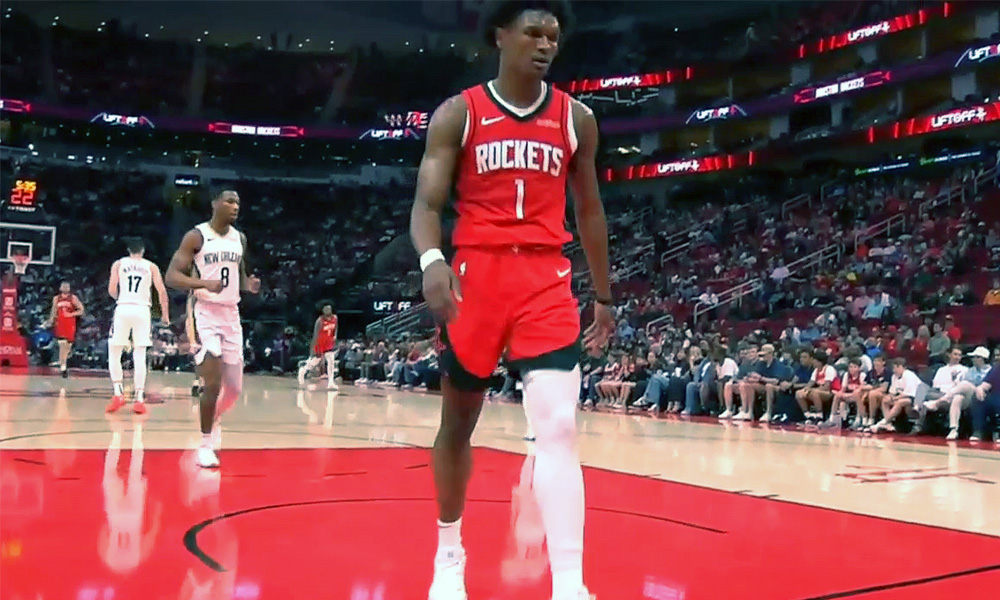
Rockets young star Amen Thompson will have his ankle injury re-evaluated in one week, according to Ime Udoka.
Thompson had an MRI on Sunday and the Rockets coach confirmed all imaging (X-ray, MRI) was negative.
“Just some swelling and pain, obviously,” said Udoka.
If you listen to Udoka, you can tell he knows how special Amen is to this team. He said the Rockets are missing a lot by not having him out there.
“Obviously, the things he does you can’t replicate,” said Udoka. “[Amen is] a guy that plays every position for us. When one goes down, he runs the point. If another is out, he runs the four.”
Amen is one of the best defensive players in the game, and as a one-on-one defender of guards/wings, he might already be the best in the league in just his second season. He’s holding his opponents to 40.5% shooting from the field, tops in the league.
“He’s a very unique defensive player,” said Udoka. “We got some guys that do some great things there, but I like to put him and Dillon on the best two usually, night to night. You got Tari and that’s a luxury as well, but the way he goes about it is different. His athleticism, size, speed, strength, shotblocking ability, steals… he’s all over the place.”
“Hard to replicate for sure.”
Amen injured his ankle late Saturday night in a blowout win against the Pelicans, but the unfortunate part was he probably should not have been on the floor in the first place.
The Rockets left Amen Thompson in the game in a blowout to get one more rebound for a triple-double and he just got injured. He's heading to the locker room with a limp. https://t.co/UBtrEpgWuU pic.twitter.com/D8GeKP8sQk
— ClutchFans (@clutchfans) March 9, 2025
The Rockets had built well over a 30-point lead by early fourth quarter. Jalen Green was able to rest the entire fourth. Alperen Sengun came out of the game with 7-8 minutes left while Dillon Brooks and Tari Eason came out with 6:00 left. But Thompson, who had posted an insane +39 on-off number, remained in the game because he was one rebound shy of a triple-double with 15 points, 11 assists and nine rebounds.
Udoka addressed that decision on Monday before the game against Orlando.
“What I typically don’t do is wholesale substitutions,” said Udoka of the decision to keep Amen in the game. “Albeit 30[-point lead] at six minutes [left] is different than losing to Minnesota, a 16-point lead with four minutes [left].”
“I’ve seen it go both ways in the past. You take out guys too early and have to bring starters back, and vice versa.”
Thompson has played in 60 games this season, five short of being eligible for postseason awards. He absolutely should be up for an All-Defensive nod this season so keep an eye on him getting back in time for that. He would need to return to action no later than April 4th for the game against the OKC Thunder in order to play enough games to be eligible.
Houston Rockets
How the Kyrie Irving Injury Impacts Rockets
Houston’s draft positioning and offseason plans could be impacted by Dallas
Published
2 months agoon
March 4, 2025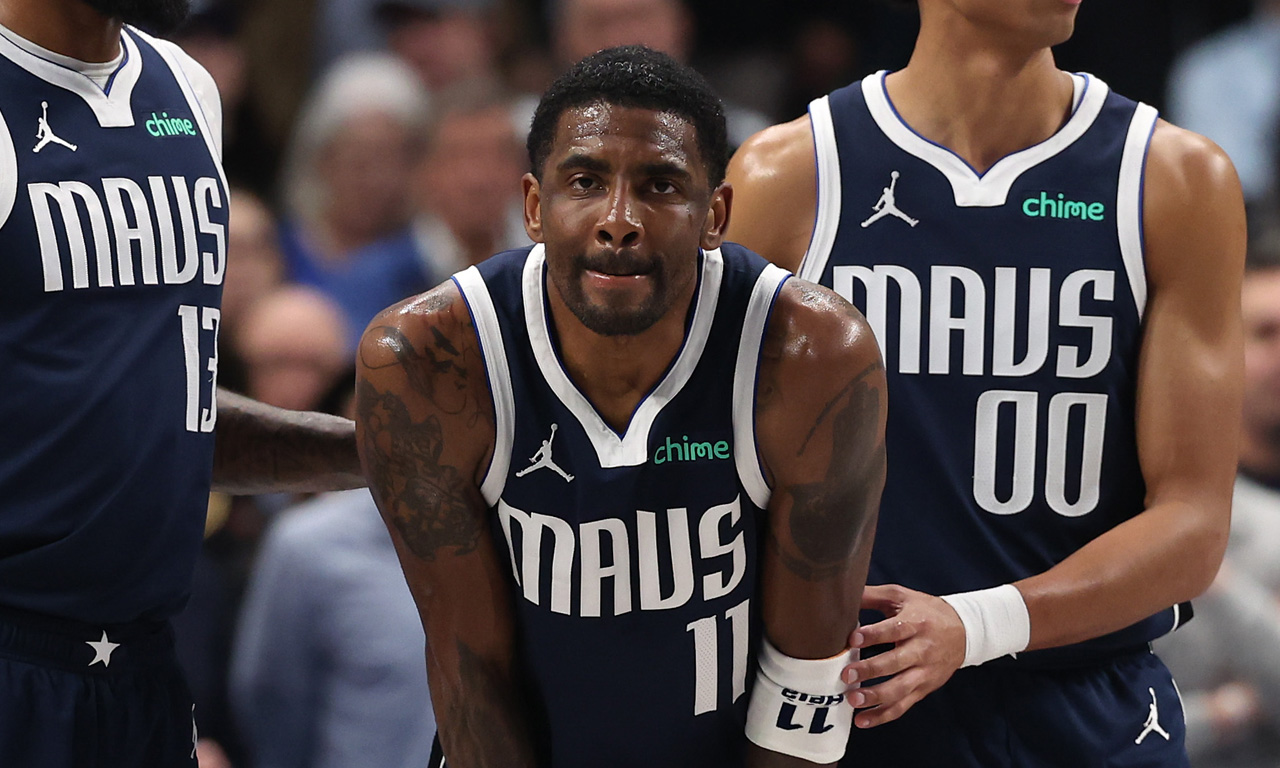
Dallas Mavericks guard Kyrie Irving was injured Monday night and the news dropped on Tuesday that the knee injury is serious — a torn ACL in his left knee that will end his season and a good portion of next season as well.
Brutal. I can’t think of an NBA team that imploded faster than the Dallas Mavericks.
You trade away a 25-year-old phenom who just hoisted you on his back en route to the NBA Finals a year ago. You cashed in that golden ticket to go all-in on a trio of aging stars in Kyrie, Anthony Davis, and Klay Thompson.
Bold strategy, Nico. Let’s see if it pays off.
(Narrator: It’s not paying off.)
The Mavericks had some interesting potential this year and maybe the next couple of years once everyone was healthy, but now? Their star guard is likely out until the calendar year 2026 and Klay and AD aren’t getting any younger nor more durable. The Mavericks may have actually swapped their future for a present that never arrives — and Dallas GM Nico Harrison has to be feeling overwhelming pressure right now.
So how does this impact the Rockets?
For starters, Houston has a game remaining on the schedule against Dallas on March 14th at Toyota Center — Davis may or may not be back for that game.
More importantly, Dallas is the 10th seed in the West at the moment, just 3.5 games ahead of the Phoenix Suns (11th seed). The Rockets control Phoenix’s first-round pick unprotected this season via a swap. We need as many West teams as possible ahead of Phoenix to keep them out of the play-in/playoffs and to push them as deep into the lotto as possible.
This complicates that. Phoenix’s remaining schedule is the toughest in the NBA by a good margin, with plenty of games left against the league’s best teams, so it still looks promising overall — but we’re talking about Kevin Durant, Devin Booker and Bradley Beal. They can still get hot at the right time while Dallas may struggle.
So keep a close eye on that. The good news is the Portland Trail Blazers are one of the hottest teams in the league and they are (shockingly) nipping at the Arizona squad’s heels.
Taking a look ahead to the offseason, the Kevin Durant Pursuit will be big.
This one is a little more complicated for Houston. The Rockets really want Devin Booker but, as of now, the Phoenix plan appears to be to trade KD this offseason and retool around Booker. The Rockets will have interest in Durant but they’re not going to sell the farm (prospects and all the picks) for a 37-year old like they would for Booker.
Three teams that I’ve heard a lot about from Rockets circles that will be in the mix are Houston, Minnesota and Dallas — Timberwolves and Mavericks have been considered the main competition. But, a lot of this will depend on Durant himself and where he wants to play at this stage of his career.
Keep in mind also, if the Suns are “retooling” around Booker and Beal (holding the no-trade clause), then they could be placing a higher priority on win-now players over the return of their own draft assets. The Rockets definitely have the best assets overall to offer up in any trade package between those three teams, but if Phoenix does prefer finding the right ready-to-win players around Booker/Beal, that gives Dallas and Minnesota a real chance.
This injury “may” take Dallas out of the equation, and they are/were definitely a contender for KD’s services given his past relationship with Kyrie and the way Dallas was positioned to win right now. Does KD at his age want to wait for Kyrie to be healthy?
And one last friendly reminder: The Rockets control that Dallas 2029 first (unprotected).
Houston Rockets
Rockets Sign David Roddy to Two-Way Contract
Former first-round pick has played with the Grizzlies, Suns and Hawks
Published
2 months agoon
March 3, 2025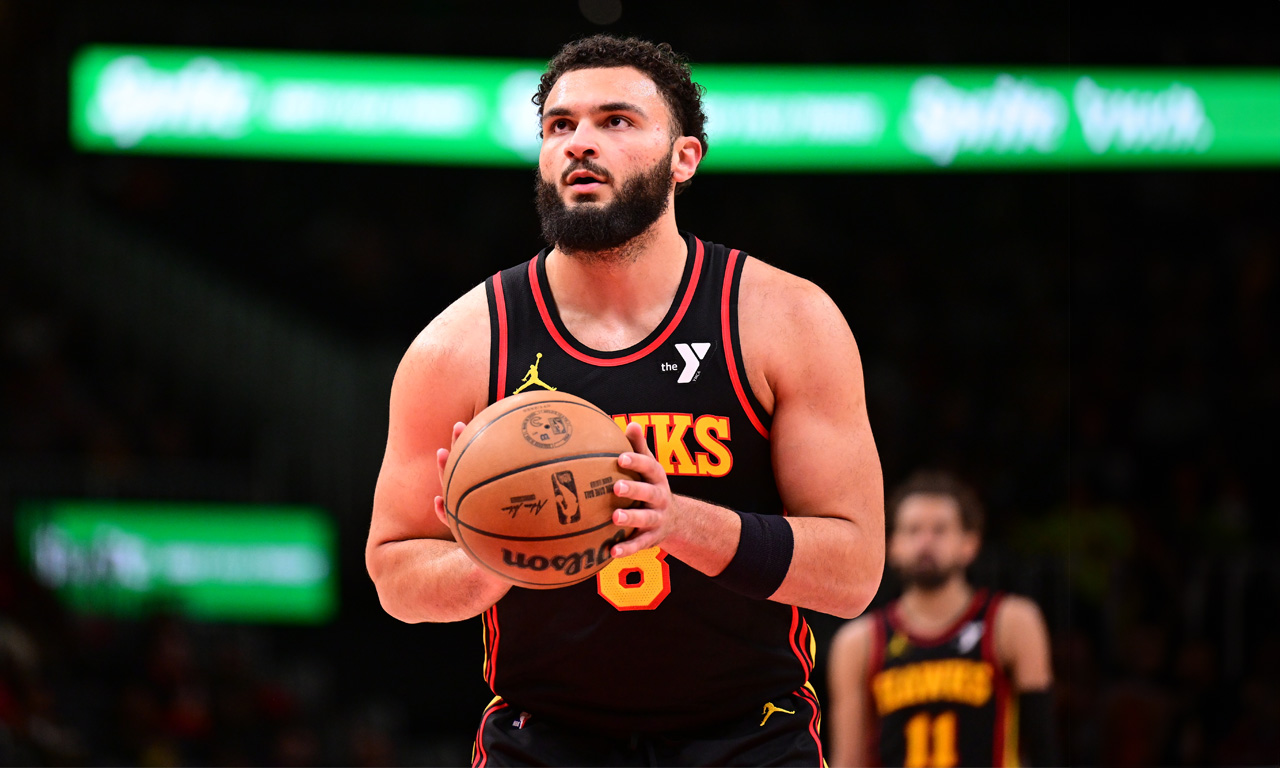
The Rockets made a move on Monday, signing former first-round pick David Roddy to a two-way contract.
The two-way spot opened up after the front office signed Jeenathan Williams to a standard four-year, $8.2 million contract (with friendly team options all along the way).
Roddy is 6-foot-5 and 250+ pounds but sports a 6-foot-11 wingspan. He was taken with the 23rd pick in the first round of the 2022 NBA Draft — six selections after the Rockets drafted Tari Eason. A standout in college, Roddy averaged 19.2 points, 7.5 rebounds, 2.9 assists, 1.2 steals, and 1.1 blocks per game during his junior season at Colorado State.
Roddy, who turns 24 later this month, is a physical player who can play multiple positions. He’s a solid rebounder for his size/position. He has played in 165 games over three seasons with the Grizzlies, Suns, Hawks and most recently Sixers, averaging 6.2 points and 2.9 rebounds per game.
The guard/forward has not shown efficient shooting, however — he’s a career 30.5% three-point shooter and just 68.4% from the line. His defense is better inside than out.
Ultimately, it will be those two things — three-point shooting and defense — that will determine his chances of carving out a consistent role in the league.
All in all, it’s a low-risk signing and the Rockets get a look at a prospect that fits their age timeline.
Houston Rockets
Houston a potential landing spot for Ben Simmons post-buyout?
Published
3 months agoon
February 6, 2025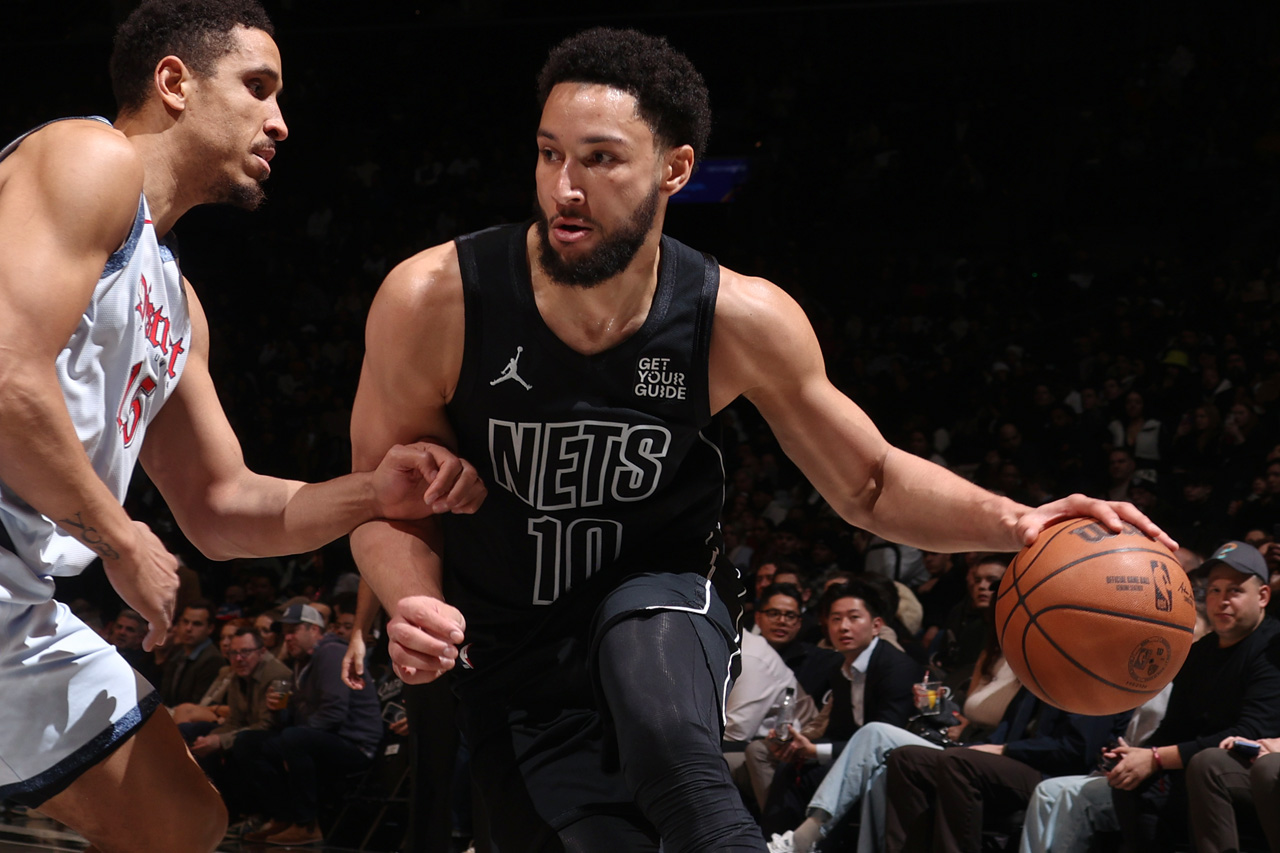
ESPN NBA analyst Brian Windhorst said on Thursday’s NBA Trade Deadline show that Brooklyn Nets forward Ben Simmons is working on a buyout and the Houston Rockets is a potential landing spot for him.
“Cleveland and Houston are two situations for Ben Simmons,” said Windhorst.
Brian Windhorst says the Cavaliers and Rockets are buyout locations for Ben Simmons.
Thoughts? pic.twitter.com/7ly4mvmxr5
— ClutchFans (@clutchfans) February 6, 2025
Advertisement
Rockets coach Ime Udoka was an assistant coach in Philadelphia in 2019-20 when Simmons was with the Sixers, before injuries took a significant toll. In fact, Udoka, when speaking about Amen Thompson earlier this season, brought up some comparisons to Simmons.
“The skill set is there, and it’s something that’s unique with his speed, athleticism, size, passing ability, and all those things,” said Udoka of Thompson. “I coached somebody, Ben Simmons, who had similar traits… as far as size and ability to push the pace, and find guys and finish. There are some similarities there.”
Both Thompson and Simmons are known for their elite athleticism, defensive versatility, and ability to create opportunities in transition.
However, can Simmons help the Rockets today? That’s the tough question.
Simmons has played in 33 games this season, averaging 6.2 points, 6.9 assists, 5.2 rebounds, 0.8 steals and 0.5 blocks in 25 minutes a night. He does not shoot threes (like, at all) — he has only attempted two threes in the past three seasons combined.
Ideally, he does not play in front of your young forwards of Amen, Tari Eason and Jabari Smith Jr. and on that basis alone, I think I would pass. But, Ime loves defensive dogs and he could use some extra ballhandling on the roster. You can see that there’s little in the way of offensive organization when Fred VanVleet is out.
There would be a comical full circle moment though if the Rockets did sign Ben Simmons, considering the Rockets were heavily criticized for trading James Harden in 2021 to Brooklyn instead of to Philadelphia for Simmons. The Rockets clearly made the right choice there.

